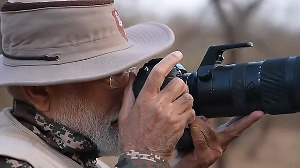No one really doubts that this is a latent power which, if properly exercised, could determine not just the pace of India's growth, but also its political and strategic influence in various countries where people of Indian descent have made a mark.
An obvious example is the United State, where the rich Indian-American community is believed to have increasingly a political voice.
If the first two Pravasi Bharatiya Divas organised in New Delhi were jamborees aimed at bringing the diverse elements of the Diaspora together under one roof, the third one in Mumbai brought the hopes and aspirations -- which at times seemed contradictory and conflicting -- of Indians and their brethren abroad into sharper focus.
If the richer Indians abroad resented being wooed for their money, the poor and oppressed in regions ranging from Fiji, Mauritius, the Caribbean and the Gulf believed they were being ignored in favor of the better off Indians in the West.
Then, of course, there was the sharp distinction between People of Indian Origin who had taken up citizenship of other countries, and those for instance in the Gulf countries, who retained their Indian passports despite years of working abroad.
It was President A P J Abdul Kalam, in his powerpoint presentation to delegates at the 3rd PBD in Mumbai, who made clear that India was not interested in just money, and nor was it callous towards the conditions of its people who worked in less fortunate circumstances.
The theme of his presentation said it all: 'Your prosperity is our happiness.'
In other words, India was not looking for handouts, but was keen to share the wealth of knowledge accumulated by people who had left its shores, recently or many generations ago.
If the NDA government had institutionalised the Pravasi Divas as an annual event, the succeeding UPA government went a step further by dedicating an entire ministry to overseas Indians. Its mandate: to assess, examine and address the issues faced by its citizens abroad, and to cement partnerships which would benefit both.
These partnerships, as spelt out by the ministry at the 4th Pravasi Bharatiya Divas in Hyderabad, would be of three kinds: i. Knowledge partnerships ('we benefit from your knowledge as you benefit from our opportunities'). ii. Institutional partnerships, which would essentially be forged between various Indian outfits like the Federation of Indian Chambers of Commerce and Industry, Confederation of Indian Industry and Assocham with apex institutions of overseas Indians. iii. Stakeholder partnerships, in which all future partnerships would be anchored by individual state governments.
As many as 12 states, many represented by their chief ministers, were thus in attendance at the event at Hyderabad, including Bihar and West Bengal.
Andhra Pradesh Chief Minister Y S Rajashekar Reddy drove home the point about 'not begging for investments' when he declared that "any investments coming in from NRIs on account of this event would only be incidental," and rubbed in the fact that sporting goods giant Adidas had found it fit to invest Rs 5 billion (Rs 500 crores) in his state --
"Whenever a meet of NRIs is organised, there is an overwhelming mistaken belief that essentially the meet is for attracting investments," he said. "More than investments, what we need from you are your success stories in various fields in the world as, back home, they will inspire many of your brothers and sisters; as we have seen so often, an inspired person or nation will somehow find avenues to come up in life and achieve success, despite lack of financial resources."
"This is, however, not to undermine the investments from NRIs. This nation gratefully acknowledges the fact that India, during the current year, has emerged as the largest recipient of remittances from NRIs with $21.7 billion, largest for any country. We value your contribution in any form."
Of course, many argue that contributions, in any form, cannot be one sided, since that would be akin to charity.
Which is perhaps why speaker after speaker at the inaugural session of the 4th PBD, including Prime Minister Manmohan Singh, stressed that India was among the fastest growing economies in the world, and hence any investment made in the county now would certainly yield profits for the investor.
To facilitate such investments, Minister of State for Overseas Indians Oscar Fernandes announced that Finance Minister P Chidambaram would launch 'an integrated universal electronic remittance gateway' at the second day of the conference.
And to mark the continuity despite the change in government, Prime Minister Manmohan Singh presented the first two Overseas Citizenship of India cards to Nivruti Rai and Iftekhar Shareef, both Americans of Indian origin. The scheme was first proposed by then Prime Minister Atal Bihari Vajpayee at the first PBD in Delhi.
Other initiatives in the pipeline include voting rights for Indian citizens in the Gulf, and the creation of a university for people of Indian origin.
But obviously, despite all the intense planning, hopes and aspirations, organising an event of such a magnitude is a logistical nightmare, and glitches, some avoidable, others not, are bound to occur.
At almost every event so far, I have found some delegates who tend to sneer at these lapses as examples of "Indian" ineptitude. Even as they do so, they do not hesitate to litter - and at times at even spit - in public places.
Sadly, the media, instead of treating such people with contempt and disdain, tends to play up their tales of woe. Criticism is easy. Praise needs more judgment and understanding than such people will ever have. Like our own Railway Minister Lalu Prasad, who believes 'The non-resident Indians (NRIs) come here (to India) and treat the meet as a picnic, nothing more.'
My advice to the minister, known more for his love for cows than for fellow citizens, would be that if he can't recognise a good thing when it's being handed to him on a plate, at least don't knock it.






 © 2025
© 2025